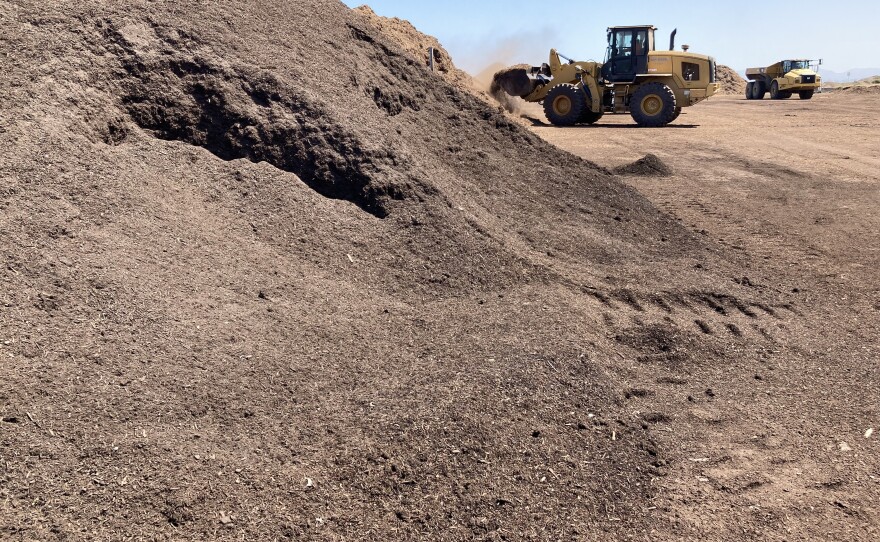It’s been seven months since California required trash haulers to start picking up and composting food waste, but the city of San Diego is still months away from complying.
CalRecycle, the state agency in charge of the effort to keep table scraps out of landfills, is being patient with municipalities that fall short but are making progress.
But SB 1383, the law requiring communities to compost food waste to help reduce emissions from landfills, does have provisions for penalties — including fines.
Renee Robertson, the head of San Diego’s Environmental Services Department, is confident that the city will be able to achieve the law’s climate goals.
She said the city had been recycling and composting green waste at the Miramar Landfill for two decades.

There is plenty of room, nearly 75 acres, and plenty of capacity to handle the expected influx of green and organic waste.
If fact, Robertson said, the plan is to turn the waste into mulch to cover gardens and lawns, plus a thick dark mixture of organic material that can bring life to the region’s sandy or clay soils.
“It’s not soil,” Robertson said. “It’s a nutrient-rich soil amendment. You can see the moisture in it.”
The Miramar Greenery is where grass clippings and shrubbery trimmings come to get a second life. The material is collected and dumped here. Then it is ground up and covered with waterproof tarps.
Oxygen gets pumped into the piles to speed up the natural composting process.

“This is a blower,” Robertson said, as she pointed to a metal box housing the electronic brain that runs the composting machinery.
It is a process that has been refined over the two decades that San Diego officials have been working to keep green waste out of the landfill.
That's unlike regular recycling, which is collected locally and relies on shipping the resulting sorted plastic and paper to far-away markets.
“What comes to this facility has been generated within 30 miles,” Robertson said. “And our final product goes right back out within 30 miles. So I think it's taking everything we think about from climate action and really flipping it in the right direction, where we’re doing it locally.”
Food handling is nothing new for the city. The Miramar Landfill already receives commercial food waste from large vendors such as Starbucks, SeaWorld and the Marine Corps Recruit Depot.

Those companies bring the waste to the greenery.
But the city has a lot of work to do to upgrade its residential collection system to pick up the food scraps from people's homes.
"Where we’ve gotten a little tripped up, of course, is some of the issues linked to the supply chain," said Joe LaCava, the City Council Environment Committee chair.
Some city residents who live in multifamily housing are already sending food scraps to be composted because they are serviced by private trash companies.
The city needs major upgrades to pick up green waste and organics in green bins every single week from its 285,000 customers.
"We’re going to switch from the current schedule, which calls for recycling and for greens to be picked up every two weeks, to include them on the weekly pickup," LaCava said. "Now, what that means is we need more trucks and drivers for those trucks to really update that collection on a more frequent basis."

The city is waiting for 43 new trucks to be delivered. That probably will not happen until after the first of the year.
When the trucks arrive, the city will also have to deliver 240,000 green-waste containers and 285,000 food-scrap buckets. Weekly pickups are needed because city officials worry that food scraps will attract rodents and other vermin.
"We really are very motivated, for environmental and regulatory reasons, to get this right at the get-go and to make sure everyone understands how this will work," LaCava said.
CalRecycle is phasing in implementation over a two-year period. If the city fails to get the program up and running, there could be a notice of violation and fines, but the process allows for ample opportunity to correct the violation before daily fines would be issued.
The state agency says it is focusing on helping municipalities comply, not on punishing those that fall short.
CalRecycle officials say that, if the entire state removes food scraps from landfills, it would be the equivalent of removing 3 million cars from local roads.
But keeping food waste out of landfills does not only rest on the city’s shoulders: Residents will be the ones who ultimately make a difference.

"We’re all generating food waste right now — that’s what I always like to point out," Robertson said. "So we’re just going to be putting it in a different bin. We’ll be putting it in our green-waste bin along with our green waste."
Robertson said changing the system was a major undertaking that would need to be done right the first time.
“This is going to be a large habit change for millions of residents,” Robertson said.
Once food scraps are being diverted, and green-waste pickups become weekly, the Miramar Greenery will handle roughly 2.5 times the amount of compostable material it is currently processing.
-
Veterans Village of San Diego is holding its 35th annual Stand Down event this weekend. The event provides food and medical care, legal assistance, employment support, housing referrals and even haircuts to veterans and veteran families experiencing homelessness.
-
How San Diego County health officials are distributing limited monkeypox vaccines. In other news, we take a look at San Diego's efforts to recycle food waste. Plus, San Diego will be getting nearly 69 million dollars in state budget funding.










